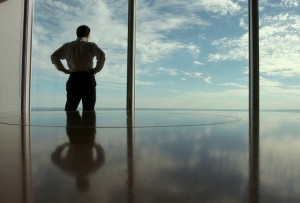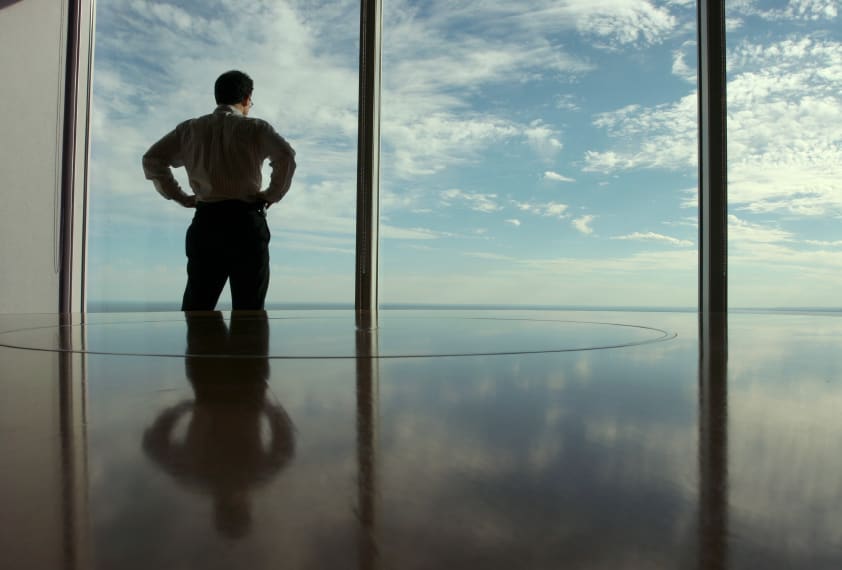There is a scene in the hit TV show “The Office” in which one of the characters, Andy, leaves work to go to a skating rink with the hope of making new friends. The scene opens with a depressing tone as Andy finds himself in an empty rink. The lights are dim, the music low, and the energy drained.
As the scene progresses, Andy becomes increasingly comfortable skating alone. The lights begin to shine and the music picks up its beat. Andy requests his favorite song and starts dancing. The mood is transformed – and he is soon having the time of his life.
When he returns to the office his friend asks him, “So, Andy, did you meet anyone?” After a slight pause he responds, “Yeah, I met a great guy. His name is Andy and I really like him.” Alone, on a dark and deserted skating rink, Andy meets his long lost best friend: he discovers himself.
 How many of us find opportunities to befriend ourselves, to get in touch with who we are, what we love about ourselves and what we need to work on a little bit? Society is goal-driven and accomplishment-oriented. People are primarily judged by what they produce – not by who they are. As a result, we are influenced to push ourselves outwards rather than to turn inwards. We run, call, build, do; rarely are we still.
How many of us find opportunities to befriend ourselves, to get in touch with who we are, what we love about ourselves and what we need to work on a little bit? Society is goal-driven and accomplishment-oriented. People are primarily judged by what they produce – not by who they are. As a result, we are influenced to push ourselves outwards rather than to turn inwards. We run, call, build, do; rarely are we still.
Do we use the pursuit of outward accomplishments as an escape from inner undertakings? Are we scared that a peek into our character would reveal the need for work…work more grueling and daunting than the pursuit of an illustrious career and physical prosperity? You may consider this and laugh: of course the path to becoming a brain surgeon or big firm lawyer is a greater challenge than character assessment!
But a reluctance to turn inward may reveal a truth deeper than our initial response. Perhaps the challenge of confronting what’s inside is indeed more difficult.
We suffer from a lack of quietude. This is not just a spiritual musing; science has borne out this truth. According to a study done by the World Health Organization in Western Europe, noise pollution taxes the cardiovascular system – and creates a collective loss of approximately 1.6 million years of life. This excess of noise, of external clutter, is quite literally killing us. It’s stripping us of life.
The inner accomplishments of developing patience, sympathy, humility, unconditional care for others, and other such priceless character traits will not present you with a six-figure check or a plaque to hang on your wall. But they will develop invaluable gems to hang in your heart. They have none of the immediate gratification, societal fame or monetary fortune, but they are the truest successes of life and fill one with an unparalleled sense of fulfillment and purpose.
To get the most out of our time here, we need to discover who we are and what makes us unique – both for good and for bad. Have we ever really thought about our flaws? Do we exhibit characteristics that are hurting other people? Does a lack of sensitivity stunt some of our most important relationships? Is our laziness inhibiting personal growth?
And what about our strengths? Have we maximized on them, brought good into the world in a way no one else can?
Throughout our lives we expend great time and energy into making the most educated and thought-out decisions for our schoolings, careers, and places of residence – even for the cars we drive and vacations we take. This is true of almost any significant investment in this world. Yet, astonishingly, the most important investment of all – one that we would sell every physical possession and pleasure in the world just to hold on to for another day – life itself, is given little to no serious time and study.
The commitment needn’t be great. If we can find a few minutes a day, or a half hour every week, to sit alone in our room or take a walk in a place where no one knows us, we can strengthen our bond with ourselves. We can unlock an abundance of unrecognized depth and delight that life has to offer us. Take a moment to ask yourself the most basic of questions…that may have escaped you your entire life.
- Who am I?
- What makes me me?
- What are the most important things in the world to me?
- What am I doing to make sure I make the most of them?
- What am I in this world for?
- Am I accomplishing my goals to the best of my ability?
The answers are not necessarily simple, but the experience of the questions alone is inherently valuable. If a person is searching, and working, the answers will come slowly with time. “Life is not a problem to be solved, but a challenge to be lived” (1). Don’t worry too much about the endpoint. It’s the baby steps that make a difference. So go lace up those skates.
(1) Gabriel Marcel cited in Jewish Values in Psychotherapy by Levi Meier, page 62
The words of this author reflect his/her own opinions and do not necessarily represent the official position of the Orthodox Union.

